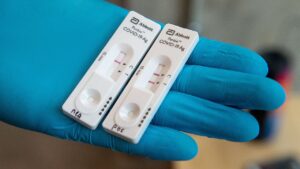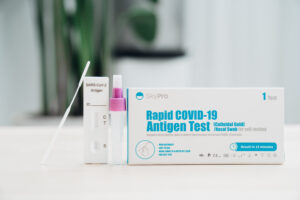
A COVID-19 test may be used to determine whether or not you have COVID-19. It is a virus test that examines samples (such as swabs) collected from your nose or throat for the presence of COVID-19 virus (breathing passages). Viral rapid antigen tests are classified into the following categories:
- A polymerase chain reaction (PCR) or nucleic acid test examines the virus’s genetic material; an antigen test examines the virus’s proteins.
- ID NOW is a test that uses a different method than the PCR test to seek for COVID-19 genetic material. It is comparable to antigen testing.
It is as follows: The COVID-19 antigen test searches for fragments of coronavirus protein. This test is fast and simple, with results available in less than 20 minutes. However, since antigen tests are less precise than PCR tests, they may fall short of meeting rapid antigen tests criteria in some cases.
How it is accomplished: Typically, the rapid antigen tests sample is taken from a nose or throat swab, although saliva may be used in rare cases. After adding the sample to the test strip, a colorful line may emerge to indicate the presence of COVID-19 proteins. A line will not show if no COVID-19 proteins are found.
One caveat is that the protein must be present in sufficient quantity for the test to be positive. If you are in the early stages of the sickness, your nose may contain a small amount of these proteins. As a consequence, it is possible to have a false-negative result, in which the test indicates that you do not have COVID-19 while in fact you do.
How to get a test: Your health clinic may provide you with an antigen COVID-19 test. However, if you choose not to visit a clinic, you may obtain antigen COVID-19 self-tests. Self-tests are available online and sometimes at retail outlets. BinaxNOW, QuickVue, Illume, and Flowflex are a few tests to search for.
How you will get your findings: If you are testing via your health clinic, you can expect to receive your results in the same manner as you do with other lab tests. Additionally, you may get tested and obtain findings within the same visit.
If you’re self-testing and want verification of a negative COVID-19 result, you’ll utilize a specific rapid antigen tests app on your phone, computer, or other camera-equipped device. Throughout the exam, a professionally trained proctor will guide you and monitor your performance. When the test is complete, the app will save the results. For further information, contact your at-home test provider. Learn some tips about how to perform rapid antigen test at home at http://drcharlesparker.com/rapid-antigen-tests-tips-and-how-they-can-help/
COVID-19 rapid PCR rapid antigen tests
What it is: Rapid PCR tests vary from regular COVID-19 PCR rapid antigen tests in that they may be processed in the clinic, with results often available within 20 minutes. The benefit of this test is that it provides findings more quickly and with more accuracy than antigen testing. However, accuracy may be less than that of conventional PCR rapid antigen tests.
How it’s done: Rapid PCR rapid antigen tests are performed using a nasal swab. The processing is comparable to that of a conventional polymerase chain reaction (PCR) test but utilizes a different kind of equipment.
How to get a test: The supply is limited. Rapid PCR rapid antigen tests are now being utilized mostly in certain urgent care clinics and pharmacies.
How you will obtain your results: You should receive your results in the same manner as you would typically receive them from your clinic or pharmacy. Additionally, you may get tested and obtain findings within the same visit.
How much does a COVID-19 test cost?
When conducted in a health care facility or drugstore, the majority of insurance carriers reimburse the entire cost of COVID-19 rapid antigen tests for active infections (PCR and antigen). Therefore, if you come in for rapid antigen tests, you will almost certainly not be charged anything.
Self-tests for COVID-19 are often not reimbursed by insurance. Antigen testing is typically between $10 and $15 for each test, although PCR tests may cost up to $150. However, bear in mind that Minnesota, Wisconsin, and Iowa all provide free PCR self-tests.
COVID-19 antibody rapid antigen tests (serology) is often reimbursed by insurance if ordered by a physician and deemed medically necessary. If you request the test independently, it may not be covered.
However, insurance coverage varies considerably – it’s always a good idea to check with your carrier to see what is and is not covered.
COVID-19 rapid antigen tests can help keep you safe and prevent the spread of the virus.
COVID-19 rapid antigen tests are a critical component of our fight against COVID-19. By identifying individuals who have COVID-19 – even if they exhibit no symptoms – testing may assist in controlling the spread of COVID-19.
Bear in mind that rapid antigen tests are not a replacement for adhering to safety rules. Therefore, even if your COVID-19 test is negative, you should continue to observe safety and masking rules, particularly if you are unvaccinated or in an environment where not everyone is vaccinated.
The real-time polymerase chain reaction (RT-PCR) assay detects the presence of viral RNA. It is very precise and efficient. This test is capable of detecting COVID-19 infection infected individuals even before they become infectious, allowing for early isolation. Thus, this approach is capable of preventing the virus from spreading to additional hosts.
The downsides include a higher financial cost in comparison to antigen testing, a longer review time, and the need for highly skilled sample handling personnel.
A healthcare practitioner collects the specimens. After thorough rapid antigen tests, the test is conducted and the outcome assessed at a professional laboratory. The result is a certificate with a validity period of 72 hours from the collection date.
The PCR test is sometimes confused with the CPR test, which is meant to identify bacterial infections and cannot be used to determine whether you have COVID-19 illness.
Discriminant polymerase chain reaction
The discriminant PCR test is a laboratory procedure that is done on positive samples and allows for the determination of whether a particular instance involves the presence of a specific mutation for which the discriminant test was devised.

Antibodies examination
This test detects the presence and, in certain circumstances, the amount of antibodies to the SARS-CoV-2 virus in the blood of individuals who have previously had COVID-19 and are recovering or have been immunized against the illness. Antibodies are not present at the start of the illness; they develop gradually around two weeks after the virus enters the body (infection) or after immunization.
Because it is indirect proof of infection, it is not feasible to establish a diagnosis solely on the discovery of antibodies; rather, it is possible to claim that a person has had the illness or has been vaccinated at some point.


